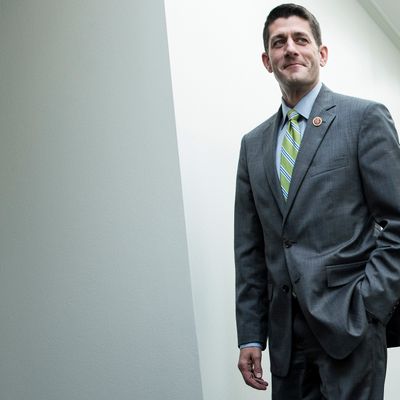
Paul Ryan’s budget proposals are not mere compilations of proposals, but grand vision statements. The classic versions relied on sweeping ideological pronouncements (i.e., “it is built on the enduring truths from which America’s Founders established this great and exceptional Nation.”) that would be perfectly at home in a Glenn Beck monologue. This year, Ryan has dramatically changed course. He has prefaced his budget with a review of the scholarly literature of the entire range of federal anti-poverty programs. In the place of grandiose, Randian lectures, Ryan ventures outside the world of right-wing pseudo-scholarship and actually attempts to engage with mainstream economic analysis.
This decision is very much to Ryan’s credit. On the other hand, it turns out to have been a gigantic mistake.
Basically everything in Ryan’s report turns out to be wrong. The Fiscal Times contacts a number of researchers whom Ryan cites, and they all report that Ryan knows nothing of their work:
One of the study’s authors, Jane Waldfogel, a professor at Columbia University and a visiting scholar at the Russell Sage Foundation, said she was surprised when she read the paper, because it seemed to arbitrarily chop off data from two of the most successful years of the war on poverty .…
Chris Wimer, the lead author on the paper and a researcher at Columbia, said Ryan’s conclusion ignores the major expansion of the earned-income tax credit in 1993 and the roaring dotcom economy of the mid-to-late 1990s. “While our data can’t disentangle those three things, attributing the decline in poverty after 1993 to the welfare reform of 1996 seems to go beyond what the data show,” Wimer said.
Barbara Wolfe, a professor at the University of Wisconsin at Madison, said Ryan’s paper simply misstates the findings of one of her papers studying the effect of housing assistance on labor outcomes .…
Wolfe also objected to Ryan’s use of another of her studies, which his paper claimed found “Only a minority of families alter their employment decisions in response to Medicaid’s design.”
Wolfe said that the study had been restricted to a small percentage of recipients, and that its findings were limited to the years prior to the welfare reform bill that passed in 1996.
Meanwhile, the Center on Budget and Policy Priorities has a longer list of the errors, distortions, and omissions in Ryan’s report. Even libertarian economist Tyler Cowen concludes that Ryan’s report presents “only a marginal command of the scholarly literature, and it is a good example of how the conservative movement is still allowing the poverty issue to defeat it and tie it up in knots.”
Ryan is very good at marshaling faux scholarship churned out by ideologues in the service of talking points, and at convincing reporters that he is an actual policy wonk. Unfortunately, he seems to have convinced himself and undertaken the ambitious goal of reconciling his policies with the work of real researchers. That was a bad, bad move.
The bigger dilemma is that Ryan’s budget goals leave him no room to maneuver. He’s committed to balancing the budget within the next decade. But he wants to prop up defense spending, refuses to increase tax revenue, and has promised to maintain Social Security and Medicare benefits for all current retirees. He recently cut a deal with Democrats to ease cuts in the main domestic spending programs. Having taken everything else off the table, the only place left for his cuts is programs that benefit the poor.
And Ryan’s budget absolutely slays the budget for anti-poverty programs – the vast majority of his spending cuts come from the minority of federal programs aimed at the poor. That fact has led to his current predicament: Democrats have painted him as a cruel social Darwinist, causing him to become concerned about his image as an “Ayn Rand miser,” causing him to re-brand himself as a poverty wonk, causing him to dive into scholarly literature. But scholarly literature is never going to show that his plans to impose massive cuts to the anti-poverty budget will help poor people.
And yet, without the massive cuts to the anti-poverty budget, Ryan has no plausible way forward. Reconciling the ideological goals of the House Republican caucus with the best findings of social science is fundamentally impossible. That’s why Republican leaders usually dismiss those findings as biased tripe from liberal eggheads.






























